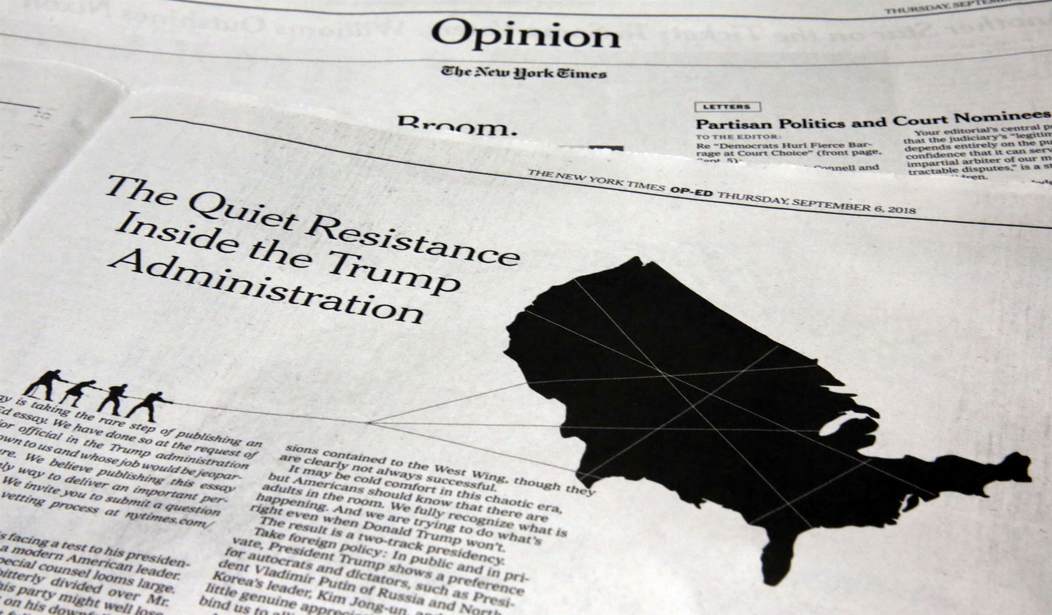It has been announced that President Trump is encouraging the Department of Justice to investigate the writer behind the anonymous New York Times “resistance” op-ed by an alleged Trump administration official that has caused such a ruckus in our national discourse the past few days.
While many (non-lawyers) have reacted negatively to the suggestion by vaguely citing the “First Amendment” and the supposed lack of classified information in the piece, which has traditionally been the basis for most successful media-related prosecutions in the past decade, nonetheless there still remain potential rationales that could be utilized against the anonymous leaker.
The crux is that the op-ed is not merely a statement of opposition against President Trump. Rather, in it the author, a government employee who has sworn an oath to a constitutional order in which the president is vested with the executive policy power, actively describes a pattern of deception and sabotage against the president of the United States. He states how he is “working diligently” to “frustrate parts of [the President’s] agenda” and “thwart” what he believes are the president’s “more misguided impulses.”
I believe the author is clearly a rogue member of DC’s long-time political and policy class – the way they think as shown in the piece, their careful dance of words reminiscent of “Never Trump” talking points, media strategy in choosing to do an op-ed in the New York Times of all places, and their mix of intrigue with brazen recklessness that would not be too surprising in a campaign or in the legislative branch but is unheard of in the executive branch.
Recommended
Every situation is different and there are few cases prior that resemble exactly such a situation. Nonetheless, that is the nature of crime and prosecution. Given President Obama’s Espionage Act successful prosecutorial aggressiveness against leakers, it would be doubtless that if this took place under him that this leaker would see a wide-ranging series of filings and motions already.
Nonetheless there are some potential statutory constructions worth considering and exploring.
First is the famous 18 U.S.C. 1001, well-known to almost all federal employees, which makes it a crime for those who “knowingly and willfully…falsifies, conceals, or covers up by any trick, scheme, or device a material fact” to the government. For example, in this case it can potentially be alleged that the official is deceiving the executive branch of their reliability and loyalty of service to the president.
Beyond deception there also could be potential crimes in relation to the actual acts of the writer in thwarting the president’s policymaking and implementation rather than the act of deception in them. Thwarting and sabotaging the government’s leadership and its policy efforts are broadly covered under US criminal statutes obviously, although in recent decades many haven’t been utilized due to there rarely being such a notable case.
Nonetheless such statutes exist – for example, 18 U.S.C 2385, which makes it an offense for one who “advocates…[the] desirability” of “destroying the government of the United States…by force.” There also are the statutes in 18 U.S.C. 2151 to 2157, concerning “sabotage” as related to national security matters. There is 5 U.S.C. 7311, making a person unable to hold a government position, as well as criminal penalties, if they advocate or are a member of a group aimed at “the overthrow of our constitutional form of government.” There are undoubtedly many more too in our government’s vast expanse of statutes to protect our nation, its national security, and governance.
Though some of these federal crimes seem vague and all-encompassing, in federal prosecution that is precisely how much of it is done. Very complex criminal statutes are difficult to prove under the strict standards and process of criminal procedure. That is why there are a few “go-to” criminal statutes that are relatively straightforward to prove due to their ease of construction and wide-ranging precedent – wire fraud, tax fraud, lying to the government, etc. – with then prosecutorial discretion deciding which cases are pursued.
After all, remember legendary criminal boss Al Capone wasn’t in the end successfully convicted of any of his horrid trail of terror and acts but rather for tax evasion, which was utilized as a way to clearly prove a major crime in what otherwise was a difficult-to-prove series of situations.
This is only a brief overview and exploratory discussion of a complex case in which we seem to only be at the very early stages of investigation, if that. Legal proceedings, particularly prosecutions under which higher standards of proof and rights protection are involved, take time and are subject to numerous steps and uncertainty.
Nonetheless, the above outlines that there could be serious cause to investigate and prosecute the anonymous writer, as well as utilize additional procedural methods in order to uncover their identity. Undermining our constitutional structure of government, deceiving our elected and appointed leaders, and through the New York Times op-ed creating widespread distrust of the government and encouraging “resistance” both within the government and outside are potentially serious crimes.
Undoubtedly it shall be interesting to see how all this develops.

























Join the conversation as a VIP Member